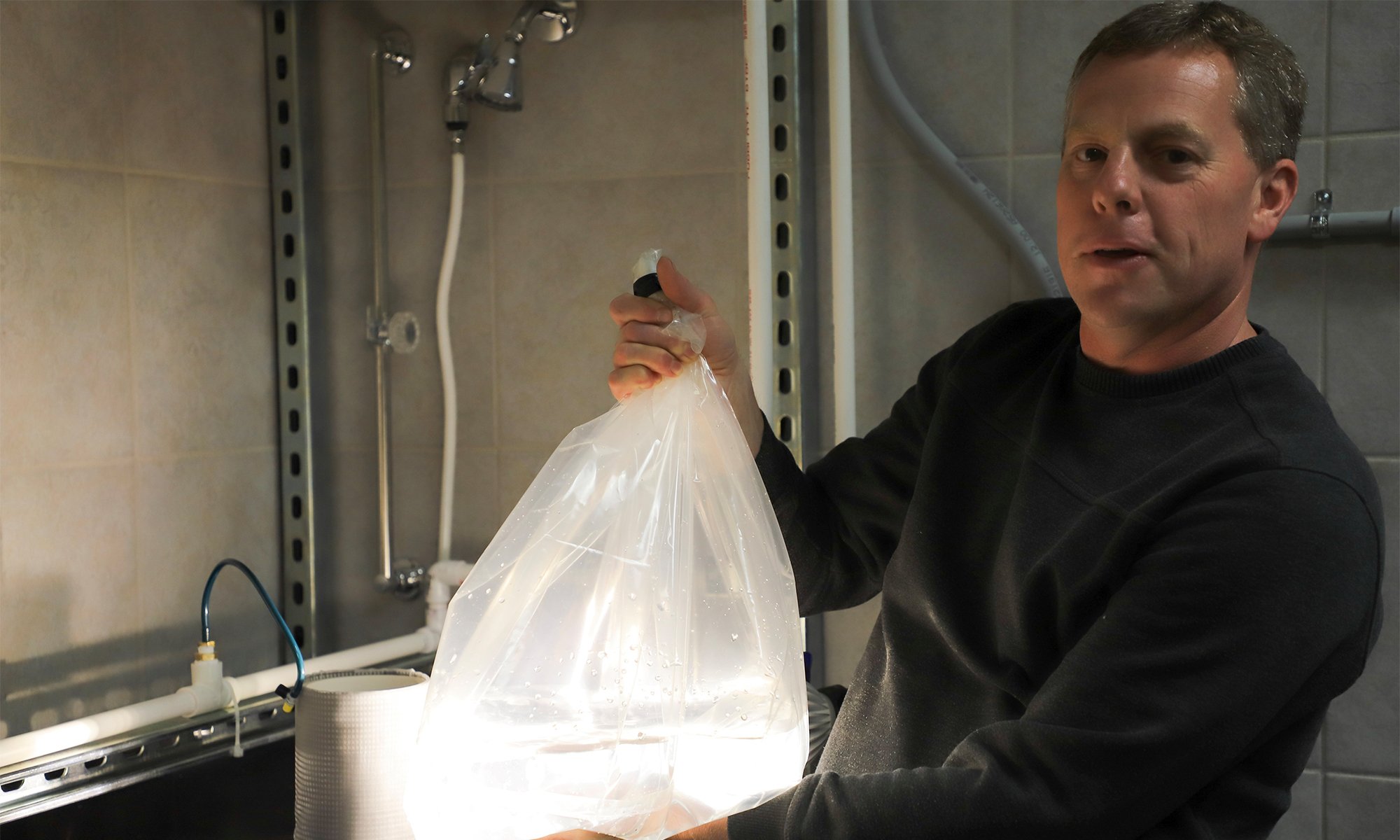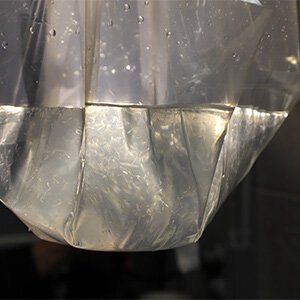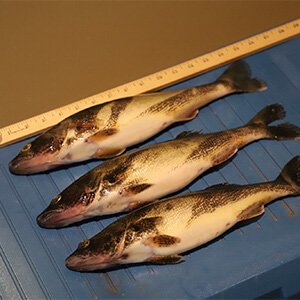 Concordia Center for Environmental Stewardship Director Mark Schmitz holds a bag full of 2,500 walleye fry that arrived yesterday evening on Concordia's campus.
Concordia Center for Environmental Stewardship Director Mark Schmitz holds a bag full of 2,500 walleye fry that arrived yesterday evening on Concordia's campus. It’s officially growing season in Wisconsin, and as gardeners statewide begin to put their green thumbs to work, Concordia University Wisconsin is in the process of building a sustainable growing system that will continue to flourish long after the fall frost comes back around.
On Thursday, May 9, Concordia took a major step forward in the setup of a state-of-the-art aquaculture and aquaponics system on campus when 5,000 newly hatched walleye were transported to campus from the hatchery where they were bred, Northern Aquaculture Demonstration Facility, which is six hours away in Bayfield, Wisconsin.
The newly hatched walleye (or fry, as they’re called) were released into holding tanks in the university’s Concordia Center for Environmental Stewardship (CCES), where they will first be feed-trained to accept a dry diet, and then, after 40 to 50 days be transferred into a brand-new aquaponics system in the front lobby of the CCES.

The fry are a vital part of what will become a self-sustaining growing system, otherwise known as aquaponics. The walleye’s waste will supply the nutrients that the plants need to grow and the plants in turn filter the water to sustain the fish and promote maximum growth.
While other colleges in Wisconsin utilize off-campus aquaponics systems, Concordia is unique in that its system is directly on its main campus. The setup is made possible thanks to a generous donation from Jay Christopher, the founder of Thatcher Corporation (an incubator for small start-up businesses) and co-founder with his wife, Doris, of The Pampered Chef, a direct sales company for fine kitchen tools.
Concordia’s mission and position for ethical environmental research
Concordia’s aquaponics system will be used mainly for research purposes and will be utilized heavily by students enrolled in the myriad science, environmental, and sustainability-focused programs offered at CUW.
Concordia’s main Mequon campus, with its 200 acres nestled next to Lake Michigan, lends itself to an array of freshwater and Great Lakes studies. In 2009, the university built its Concordia Center for Environmental Stewardship, which exists to provide environmentally oriented academic and research opportunities for students and community members alike. At the time of its construction, the CCES was one of only three LEED Platinum-rated facilities in Wisconsin. A LEED Platinum rating is the highest certification given to environmentally friendly and energy-efficient buildings.

As director of the CCES, Dr. Mark Schmitz plays an integral role in the programming of the center and will work closely with the new aquaponics system. In fact, it was Schmitz who advocated for the system’s installation.
Schmitz is well-equipped for the aquaponics addition. His master’s work focused on aquaculture, and his dissertation examined the ecology of walleye. Schmitz started experimenting with aquaponics in the late 1990s, when modern-day systems were still in the infancy stages of gaining popularity. Prior to his start at Concordia in 2017, Schmitz managed a private fish hatchery in Sheboygan County and then worked for seven years as an associate professor of biology at the University of Wisconsin-Sheboygan. During his time at UW-Sheboygan, Schmitz was instrumental in setting up a “green roof”—a vegetative system on the rooftop of one of the academic buildings—and he also started a now-defunct aquaponics system on the college campus there.
“We were doing various experiments with the aquaponics system in Sheboygan and were able to identify, for example, which varieties of basil perform better and under what conditions,” Schmitz says. “That’s what makes me excited about this aquaponics system we’ll have at Concordia. It offers the chance to do meaningful research that will help the industry and help growers.”

In addition to its research potential, the benefit of the aquaponics system is that it will produce usable product. Schmitz says he sees possibility for the homegrown vegetation to be incorporated into Concordia’s dining options, and the desirable walleye adds an extra layer of appeal and uniqueness to Concordia’s system. Most aquaponics systems currently in existence utilize tilapia instead, and so Concordia’s walleye production will not likely go to waste, especially when Wisconsin fish fry season rolls around, says Schmitz.
With its focus on ethical solutions to environmental problems, the CCES and its latest endeavor further support the mission of Concordia University and compliment a wide variety of studies within the university, including art, business, or justice and public policy studies.
“Because Concordia offers such a variety of disciplines, we’re able to apply the concepts of sustainability and Christian stewardship from a variety of perspectives,” Schmitz says. “It’s rewarding to me to be able to teach students about things like being good stewards of the resources we’ve been given.”
It’s rewarding to me to be able to teach students about things like being good stewards of the resources we’ve been given. —Dr. Mark Schmitz, CCES director
A symbiotic relationship
It’s that sort of altruistic motivation that moved Jay Christopher to donate. Christopher explained his motivation to donate to the aquaponics project stems from his passion for sustainable living, his trust in the leadership of the project, and his alignment with the values and mission of the university.
“Lutheran education has had a tremendous positive impact on my life, and so I have made a point to bolster and champion Lutheran education when opportunities present,” says Christopher, who attended Lutheran schools from grade school to high school and in his studies at Valparaiso University.
Not to mention, Christopher just really enjoys walleye. He used to make annual trips to Ontario, Canada, mainly for the purpose of fishing walleye. He’s since stocked his farm ponds with the species as an alternative to making the lengthy trips north. Christopher owns 50 acres of private botanical gardens located along the western shoreline of Lake Michigan, just north of Sheboygan, and regularly hosts educational and philanthropic events at his scenic grounds, The Christopher Farm and Gardens.
An added benefit of Christopher’s gift to Concordia is that it has opened the door to collaboration between Schmitz and Christopher’s staff aquatic biologist, Miles Thompson.
“Eventually our world will need to explore more new methods of food production,” says Christopher. “It’s exciting to me to find alternative ways of producing food, and I’m eager for the day when we can tap into Mark’s expertise and add an aquaponics system to Christopher Farm and Gardens as well. We’d be heading down a path that isn’t well-trodden, and the potential educational benefits would be endless.”
— This story is written by Kali Thiel. Kali was Director of University Communications until April, 2025.
If this story has inspired you, why not explore how you can help further Concordia's mission through giving.